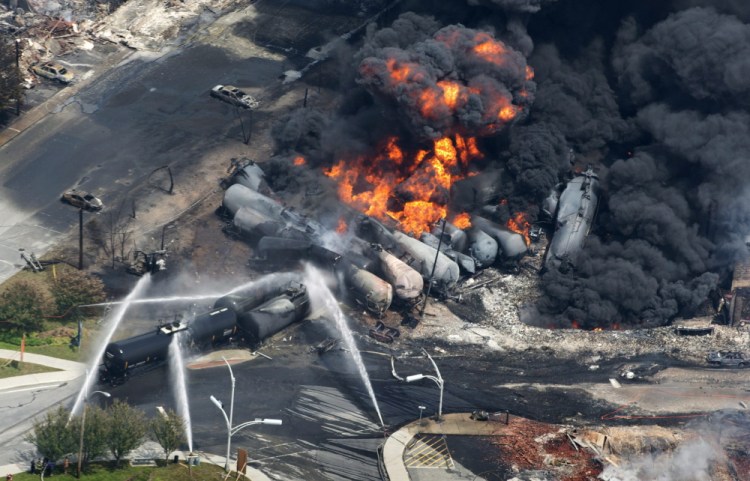Pagers beeped around 4 a.m. across rural western Maine, rousing firefighters during their July Fourth vacations with reports of a rail disaster in Quebec.
In less than an hour, the first hit the road. Even 30 miles away, firefighters saw black smoke billowing from the town of Lac-Megantic. Red lights flashing, their trucks crossed into Canada, waved through in a sign of the urgency.
Upon arrival a few miles later, they discovered a small contingent of Canadian firefighters facing down a monster of a blaze that was transforming paved roads into sand, shooting flames out of manholes, setting even a lake aflame. The smell of burned flesh hinted at the human toll.
“It was like a World War II bombing zone,” said Tim Pellerin, fire chief in Rangeley. “There was just block after block of everything incinerated. All that was left were foundations and chimneys. Everything burned. The buildings, the asphalt, the grass, the trees, the telephone poles. Just about everything was incinerated.”
A language barrier separated the English-speaking Maine firefighters from their French-speaking Canadian counterparts. But now they share a bond forged of the horror of that night in which a derailed oil train destroyed a town and killed 47 people. Some of the Quebec firefighters traveled to Rangeley last fall for a cookout with their Maine brethren. Many will reunite this weekend, marching together on the anniversary.
Pellerin said the brotherhood of firefighters “knows no bounds.”
“There was never any question of whether we should go,” Pellerin said. “Some of our brothers across an international border needed help.”
It was early July 6, 2013, when a train transporting oil was left unattended by its lone crew member while parked outside Lac-Megantic. The train rolled downhill toward the town of 10,000, where more than 60 cars derailed and many exploded. Forty-seven people died, and dozens of buildings were destroyed.
Tim Hardy, a firefighter and emergency management director in Franklin County, learned of the disaster at 3:30 a.m. Communication with Canadian officials was spotty, but he began mobilizing volunteers on the holiday weekend.
All told, about 30 Maine firefighters and nine trucks headed north. They arrived in Lac-Megantic to what Pellerin described as an “eerie quiet.”
The only sound, Pellerin said, was the roar of the fire – like a blow torch. By then, part of downtown was destroyed.
Farmington Fire Chief Terry Bell had joked that they’d get there to discover the fire was out, leaving them with nothing to do. Then he saw a mushroom cloud on the horizon.
They were stunned to find only about 50 Canadian firefighters battling the blaze, a woefully small number considering the immensity of the disaster.
Though they spoke different languages, they quickly came up with assignments.
Some of the Maine firefighters worked briefly to save the downtown buildings, but their main duty was to prevent the disaster from spreading. The Maine firefighters inched their ladder trucks closer toward the unexploded tankers and began pouring water on them to cool them and prevent more blasts. Hydrants were out of commission, so firefighters ran 6,000 feet of hose from the lake, pumping more than a million gallons of water.
A year later, the railroad responsible for the tragedy, the Maine-based Montreal, Maine and Atlantic Railway, has been sold and is under new ownership. The new company, Central Maine and Quebec Railroad, wants to resume oil shipments in the future. But it’s in no hurry to press the issue.
Wounds in Lac-Megantic remain raw. Now the focus is on creating a settlement fund to compensate survivors. The environmental cleanup alone could end up costing $200 million to $500 million, based on early estimates.
As bad as it was, it could have been worse if not for the efforts of Lac-Megantic firefighters, who were left alone to battle the blaze for what probably seemed like an eternity before help arrived, Hardy said.
“They deserve a lot of praise and credit,” he said. “They did a great job to save the lives and property that they did.”
Copy the Story LinkSend questions/comments to the editors.




Success. Please wait for the page to reload. If the page does not reload within 5 seconds, please refresh the page.
Enter your email and password to access comments.
Hi, to comment on stories you must . This profile is in addition to your subscription and website login.
Already have a commenting profile? .
Invalid username/password.
Please check your email to confirm and complete your registration.
Only subscribers are eligible to post comments. Please subscribe or login first for digital access. Here’s why.
Use the form below to reset your password. When you've submitted your account email, we will send an email with a reset code.